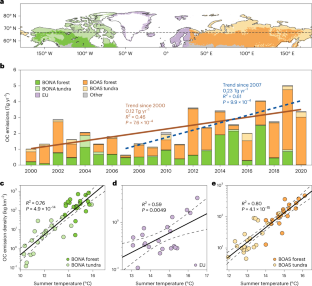Increasing aerosol emissions from boreal biomass burning exacerbate Arctic warming
IF 27.1
1区 地球科学
Q1 ENVIRONMENTAL SCIENCES
引用次数: 0
Abstract
The Northern Hemisphere boreal region is undergoing rapid warming, leading to an upsurge in biomass burning. Previous studies have primarily focused on greenhouse gas emissions from these fires, whereas the associated biomass burning aerosols (BBAs) have received less attention. Here we use satellite-constrained modelling to assess the radiative effect of aerosols from boreal fires on the climate in the Arctic region. We find a substantial increase in boreal BBA emissions associated with warming over the past two decades, causing pronounced positive radiative effects during Arctic summer mostly due to increased solar absorption. At a global warming level of 1 °C above current temperatures, boreal BBA emissions are projected to increase 6-fold, further warming the Arctic and potentially negating the benefits of ambitious anthropogenic black carbon mitigation. Given the high sensitivity of boreal and Arctic fires to climate change, our results underscore the increasingly relevant role of BBAs in Arctic climate. Boreal fires are expected to increase with warming, but how the aerosols emitted in these fires affect the climate is not well understood. Here the authors show that this increase in boreal fire aerosols results in a positive radiative forcing, leading to additional Arctic warming.


北方生物质燃烧产生的气溶胶排放量增加加剧了北极变暖
北半球北方地区正在迅速变暖,导致生物质燃烧激增。以往的研究主要关注这些火灾产生的温室气体排放,而相关的生物质燃烧气溶胶(BBAs)却较少受到关注。在这里,我们利用卫星约束模型来评估北方大火产生的气溶胶对北极地区气候的辐射效应。我们发现,在过去二十年里,北方 BBA 排放量随着气候变暖而大幅增加,在北极夏季造成了明显的正辐射效应,这主要是由于太阳吸收增加所致。在全球变暖水平比当前温度高 1 ℃ 的情况下,预计北方黑碳排放量将增加 6 倍,从而进一步加剧北极变暖,并有可能抵消大幅减缓人为黑碳排放所带来的益处。鉴于北方和北极地区的火灾对气候变化的高度敏感性,我们的研究结果强调了北方黑碳在北极气候中日益重要的作用。
本文章由计算机程序翻译,如有差异,请以英文原文为准。
求助全文
约1分钟内获得全文
求助全文
来源期刊

Nature Climate Change
ENVIRONMENTAL SCIENCES-METEOROLOGY & ATMOSPHERIC SCIENCES
CiteScore
40.30
自引率
1.60%
发文量
267
审稿时长
4-8 weeks
期刊介绍:
Nature Climate Change is dedicated to addressing the scientific challenge of understanding Earth's changing climate and its societal implications. As a monthly journal, it publishes significant and cutting-edge research on the nature, causes, and impacts of global climate change, as well as its implications for the economy, policy, and the world at large.
The journal publishes original research spanning the natural and social sciences, synthesizing interdisciplinary research to provide a comprehensive understanding of climate change. It upholds the high standards set by all Nature-branded journals, ensuring top-tier original research through a fair and rigorous review process, broad readership access, high standards of copy editing and production, rapid publication, and independence from academic societies and other vested interests.
Nature Climate Change serves as a platform for discussion among experts, publishing opinion, analysis, and review articles. It also features Research Highlights to highlight important developments in the field and original reporting from renowned science journalists in the form of feature articles.
Topics covered in the journal include adaptation, atmospheric science, ecology, economics, energy, impacts and vulnerability, mitigation, oceanography, policy, sociology, and sustainability, among others.
 求助内容:
求助内容: 应助结果提醒方式:
应助结果提醒方式:


